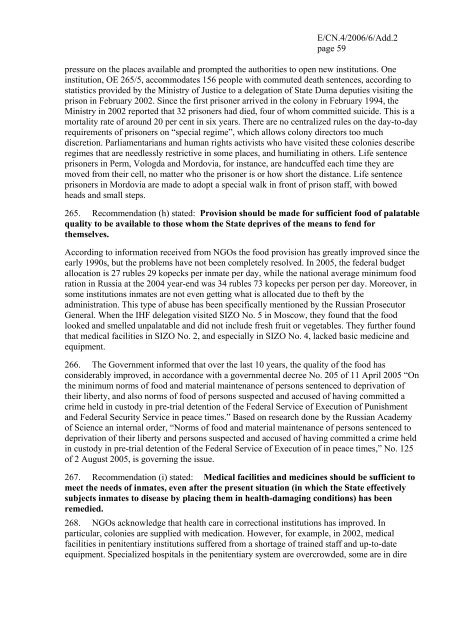E Economic and Social Council - acnudh
E Economic and Social Council - acnudh
E Economic and Social Council - acnudh
Create successful ePaper yourself
Turn your PDF publications into a flip-book with our unique Google optimized e-Paper software.
E/CN.4/2006/6/Add.2<br />
page 59<br />
pressure on the places available <strong>and</strong> prompted the authorities to open new institutions. One<br />
institution, OE 265/5, accommodates 156 people with commuted death sentences, according to<br />
statistics provided by the Ministry of Justice to a delegation of State Duma deputies visiting the<br />
prison in February 2002. Since the first prisoner arrived in the colony in February 1994, the<br />
Ministry in 2002 reported that 32 prisoners had died, four of whom committed suicide. This is a<br />
mortality rate of around 20 per cent in six years. There are no centralized rules on the day-to-day<br />
requirements of prisoners on “special regime”, which allows colony directors too much<br />
discretion. Parliamentarians <strong>and</strong> human rights activists who have visited these colonies describe<br />
regimes that are needlessly restrictive in some places, <strong>and</strong> humiliating in others. Life sentence<br />
prisoners in Perm, Vologda <strong>and</strong> Mordovia, for instance, are h<strong>and</strong>cuffed each time they are<br />
moved from their cell, no matter who the prisoner is or how short the distance. Life sentence<br />
prisoners in Mordovia are made to adopt a special walk in front of prison staff, with bowed<br />
heads <strong>and</strong> small steps.<br />
265. Recommendation (h) stated: Provision should be made for sufficient food of palatable<br />
quality to be available to those whom the State deprives of the means to fend for<br />
themselves.<br />
According to information received from NGOs the food provision has greatly improved since the<br />
early 1990s, but the problems have not been completely resolved. In 2005, the federal budget<br />
allocation is 27 rubles 29 kopecks per inmate per day, while the national average minimum food<br />
ration in Russia at the 2004 year-end was 34 rubles 73 kopecks per person per day. Moreover, in<br />
some institutions inmates are not even getting what is allocated due to theft by the<br />
administration. This type of abuse has been specifically mentioned by the Russian Prosecutor<br />
General. When the IHF delegation visited SIZO No. 5 in Moscow, they found that the food<br />
looked <strong>and</strong> smelled unpalatable <strong>and</strong> did not include fresh fruit or vegetables. They further found<br />
that medical facilities in SIZO No. 2, <strong>and</strong> especially in SIZO No. 4, lacked basic medicine <strong>and</strong><br />
equipment.<br />
266. The Government informed that over the last 10 years, the quality of the food has<br />
considerably improved, in accordance with a governmental decree No. 205 of 11 April 2005 “On<br />
the minimum norms of food <strong>and</strong> material maintenance of persons sentenced to deprivation of<br />
their liberty, <strong>and</strong> also norms of food of persons suspected <strong>and</strong> accused of having committed a<br />
crime held in custody in pre-trial detention of the Federal Service of Execution of Punishment<br />
<strong>and</strong> Federal Security Service in peace times.” Based on research done by the Russian Academy<br />
of Science an internal order, “Norms of food <strong>and</strong> material maintenance of persons sentenced to<br />
deprivation of their liberty <strong>and</strong> persons suspected <strong>and</strong> accused of having committed a crime held<br />
in custody in pre-trial detention of the Federal Service of Execution of in peace times,” No. 125<br />
of 2 August 2005, is governing the issue.<br />
267. Recommendation (i) stated: Medical facilities <strong>and</strong> medicines should be sufficient to<br />
meet the needs of inmates, even after the present situation (in which the State effectively<br />
subjects inmates to disease by placing them in health-damaging conditions) has been<br />
remedied.<br />
268. NGOs acknowledge that health care in correctional institutions has improved. In<br />
particular, colonies are supplied with medication. However, for example, in 2002, medical<br />
facilities in penitentiary institutions suffered from a shortage of trained staff <strong>and</strong> up-to-date<br />
equipment. Specialized hospitals in the penitentiary system are overcrowded, some are in dire
















